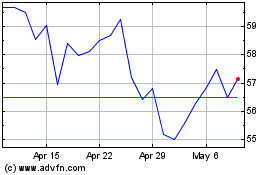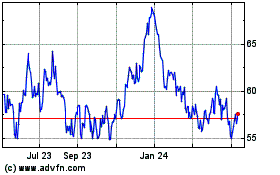By Rhiannon Hoyle
SYDNEYSHY--The world's biggest mining company BHP Billiton Ltd.
unveiled its weakest annual earnings since 2003 on Tuesday and cut
its long-term forecast for Chinese steel demand. But its top
executive expresses confidence its most important customer, China,
is on track, despite its current bout of market and economic
turbulence.
Speaking after his company revealed an 86% dive in net profit
for the year ended June to $1.91 billion, BHP Chief Executive
Andrew Mackenzie said China's economic-reform program would likely
make world markets more volatile. Still, he said the mining company
expects China's broader economy to lift in the second half, meeting
its 7% growth target for 2015. Interest-rate cuts, along with moves
to support the property market and infrastructure spending, should
buttress growth for the rest of the year, he said.
As the world's leading commodities producer, with interests in
iron ore, coal, oil and gas and copper, BHP is arguably one of the
major global businesses most exposed to China's fortunes. The
mining company relies on China for roughly 30% of its revenue, UBS
estimates.
Weaker prices for all the commodities it produces cut into
earnings last year, and it wrote down the value of assets including
a gas field and nickel mine by more than $2 billion.
BHP also lowered its closely watched forecast of peak Chinese
steel demand to between 935 million tons and 985 million tons in
the mid-2020s, from a previous projection of 1 billion-to-1.1
billion tons.
Still, Mr. Mackenzie said China's leaders had a clearly
articulated strategy, and that his company had adapted
accordingly.
"You have to look deeply and you have to look across at the
sectors, and that is what we do," he said. "We have been at this
game for decades. We have made very sound business decisions off
those forecasts that have proved to be correct."
Global financial markets have been pummeled and commodities
dumped in a broad-based selloff in recent days, rooted in concerns
over China's economic slowdown. An equity-market rout in China
continued for a second day on Tuesday, after its main Shanghai
stock market recorded its worst single-day loss in more than eight
years the previous day.
Concerns about China's economy, and particularly its demand for
commodities, have been escalating since the surprise devaluation of
the yuan two weeks ago. Recent economic data have also been
uninspiring.
BHP's own London-listed shares slumped by 9.1% Monday. But they
recovered by 5.6% Tuesday despite the profit slide, as the company
said it had paid down debt, cut costs more than expected and would
keep paying a steady-or-rising dividend each year.
"Cycles are part of our industry," Mr. Mackenzie said. "We have
to get better in the way we operate" rather than rely on markets
improving, he said.
China's breakneck economic growth during the 2000s led to a
seemingly endless appetite for commodities used to build new cities
and in the factories that fed an export boom. That led mining
companies such as BHP to aggressively dig new pits and build new
processing plants to profit from surging resources demand.
Now that demand growth has cooled, several commodities face a
period of oversupply. Iron ore, BHP's primary money spinner, has
been at the sharp end of the deceleration, with the commodity
recently slumping to a decade low. It traded above $190 a metric
ton in 2011 but now trades at roughly $50 a ton.
China's appetite for steel, used in skyscrapers and bridges, has
been eroded by a cooling construction sector, resulting in a glut
of the material and the materials used to make it, iron ore and
coal.
"The problem lies in infrastructure-led growth," said Steve
Johnson, chief investment officer at Sydney-based Forager Funds
Management, adding that he was "very negative" on the outlook for
China. "A collapse in that part of the economy is very bad for
resources demand."
Still, he said BHP is better placed to deal with the slowdown
than smaller rivals. "You know they are still going to throw off
cash, and they are a company that is going to be around in 20
years' time," he said.
China is now trying to direct its economy away from exports and
manufacturing to consumer-led growth. BHP has already been
adjusting its strategy to account for that.
It has no plans for big new investments in iron ore or coal,
instead choosing to prioritize growth in copper and petroleum,
which it thinks a more urbanized, wealthy China will need in
greater volumes.
BHP consequently feels "to some extent vindicated" by the shifts
in the Chinese economy, Mr. Mackenzie said.
Write to Rhiannon Hoyle at rhiannon.hoyle@wsj.com
Subscribe to WSJ: http://online.wsj.com?mod=djnwires
(END) Dow Jones Newswires
August 25, 2015 07:01 ET (11:01 GMT)
Copyright (c) 2015 Dow Jones & Company, Inc.
BHP (NYSE:BHP)
Historical Stock Chart
From Mar 2024 to Apr 2024

BHP (NYSE:BHP)
Historical Stock Chart
From Apr 2023 to Apr 2024
